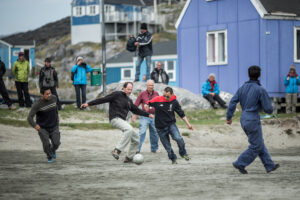The Northerners
People and cultures shaped by nature
Introduction
Many of the countries and regions in the North Atlantic and the High Arctic are characterized by vast wilderness areas and a diversity of people, cultures and societies. Here you will find communities featuring a wide variety of lifestyles, from large urban towns to small and very remote communities. Indigenous peoples, often in iconic traditional costumes, follow centuries-old ways of life – hunting, trapping and fishing – and are all part of today’s North. But so are the urban centers, featuring modern industry and high technology. Infrastructure varies, and in some areas accessibility to communities may be difficult due to remoteness. But in most places access to mass media and Internet is highly developed, ensuring the rest of the world is only a keystroke away.
While differences exist, there are also many similarities that characterize and unify the northern peoples, cultures and communities. Natural resources and climate are perhaps the two most important factors shaping these regions and their inhabitants. Access to natural resources often dictate where people settle, while the relatively cold climate and unpredictable weather influence cultural norms, traditions and mentalities.
Hunting, trapping and fishing still play an important role in a large part of the northern areas. While some communities may depend on such activities as a way of life, hunting and fishing are undertaken by many northerners as a fundamental element of the strong tradition for outdoor recreation and use of important natural resources.
Most northerners are born and raised in democracies, with equal rights for men and women, and consider themselves open-minded. In the North-Atlantic countries, there are as many women as men who are employed and have higher education. High levels of free public services, such as schools and health care, are financed through relatively high taxes, which are also often imposed on goods and services. Visitors may therefore find price levels higher than they are used to.

Visitors may sometimes get the impression that northerners, like their climate, are cold. Please do not be mistaken. Beneath the sometimes reserved demeanor, there is most likely a warm, humorous and hospitable personality. Visitors may also find many northerners quite direct in speech, not taking themselves too seriously and relatively relaxed and informal in front of guests.
We wish you a warm welcome to the North, and kindly ask you to follow some important guidelines to ensure that your visit results in a happy, friendly and sustainable experience for everyone.
Guidelines
When visiting the North, remember that you have left home to gain new experiences and insight into the lives of others. It’s important not to judge other cultures based on one’s own sense of reality, norms and values. Make an effort to understand and respect the idea that cultures can be different.
- Engage the people and cultures with respect; an open mind leads to the best experiences.
Talk to, and not about, the people you meet. - Think of yourself as an ambassador for your country and culture, as the locals are for theirs. Politeness and good manners are always appreciated.
- Please do not litter. In remote areas, please also consider the community’s ability to handle waste. Perhaps you should bring some of it, and especially special category waste, back with you.
- You are encouraged to buy local souvenirs and products, to support and sustain the community you are visiting.
- In most settlements, supplies are regularly delivered and you should feel free to buy what is offered in stores and markets. In smaller, more remote settlements where new supplies do not come often, there might be limited access to some items, e.g. fresh food. In these places, it is recommended to ask advice from your guide or the locals before you buy products such as fresh fruits and vegetables.
- It is not customary to bargain in these parts of the world, not even in markets.
- Please always respect privacy and private property, and places of religious or cultural significance.
- Never enter a private house without an invitation
- Do not glance or photograph through windows
- Ask before you take photographs of people – a hesitation means no –
- Never photograph or give presents to children without their superiors’ permission
- Do not disturb religious or cultural ceremonies and do not photograph such occasions without permission
- Do not walk on graves
- A large group of visitors can easily impact everyday life in small communities, so please be aware of your surroundings. If you are part of such a group, consider how you can contribute to the best possible interaction, for example, by avoiding blocking roads, entrances and exits.
- Suspend loudspeaker announcements on deck if there is a risk of disturbing local communities, except for mandatory or necessary safety announcements.
If at all possible, use toilets for human waste. Please do not leave sanitary items in nature.Thank you for being a considerate visitor, and we hope you visit again.







